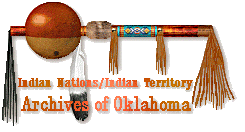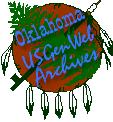Tulsa County
"Links
to web sites that are not part of the USGenWeb Project are provided for
your convenience
and do not imply any endorsement of the web sites or
their contents by The USGenWeb Project."
Race
Riot of 1921
Here is a Link to
the Race Riot Commission
Additional links at the bottom
On May 31, 1921, Tulsa's pace as a progressive,
booming, civilized city was halted as a bitter race riot erupted. The
riot had it's roots in a rumor involving a young black man and a white
female elevator operator in the Drexel Building at Third and Main
Streets. It was alleged by the woman that the man grabbed her by the
arm in the elevator and she struck him about the head with her purse.
He was arrested that afternoon by city police.
That night rumors began flying in the downtown area that the young man
was to
be lynched and many whites began gathering at the courthouse to see if
a
lynching party had been formed. Newspaper reports of that period state
that an
open touring car occupied by several black men drove up to the
courthouse and a
shot or two was fired. That was the spark that ignited the city into a
mass of
ugly people turning against each other with all the hatred they could
muster.
Newspapers reported that blacks made an armed attack against the
downtown
district. Whites responded by breaking into every store in the downtown
area,
such as sporting goods and hardware stores, grabbing rifles, pistols,
shotguns
and ammunition. They launched an attack against the blacks and soon the
riot
shifted to the southern fringe of north Tulsa in the area of the Frisco
tracks
and Greenwood Avenue. The whites poured gunfire into the black area
until
midnight.
Tulsa's police force was small and not able to halt the rioters, so
Mayor T.D.
Evans asked the governor to send in the National Guard. Shortly after
midnight,
Guard units from Oklahoma City were sent to Tulsa by special train.
While the
Guard was on it's way, the white mob running amok in the Tulsa streets
turned to
arson.
The first fire was set near Archer Street and Boston Avenue. Fire
companies
answered the alarm, but the rioters drove them off and would not let
them fight
the fire.
At dawn on June 1, 1921, smoke hung over the north end of Tulsa. Since
the
previous midnight, the white rioters had burned 35 blocks of north
Tulsa to the
ground. Piles of bricks and rubble, a few chimneys and columns standing
here and
there in the ruins, was all that remained of the black area. The
section looked
like it had been hit by an atomic bomb.
Later that morning, the armed blacks made their last stand at the foot
of
Standpipe Hill. They were huddled in groups behind trees and in small
buildings.
According to a report in the Tulsa Tribune newspaper, the National
Guard
mounted two machine guns and poured a deadly fire into the area. The
black group
then surrendered. They were disarmed and marched in columns to
Convention Hall,
the McNulty baseball park at 11th Street and Elgin Avenue, the
Fairgrounds and a
flying field east of Tulsa. Tulsa had a black population of about 7,000
at that
time and many of them fled into the Osage Hills and to the surrounding
towns to
escape the riot. On the afternoon of June 2, the National Guard troops
left the
city, and Tulsans began giving assistance to the displaced blacks. It
had been
an ugly, wasteful and sad two days for the city. Ten whites and
twenty-six
blacks are known to have been killed.
There was no further violence from either side and several weeks after
the
riot, work started on rebuilding the burned-out area.
Source: Lori A. BECKETT
December 29, 1996
Most recent revision Sunday, May 24, 1998.
An Article published by Workers
World Newspaper, June 10, 1999
An Article written by Ed
Wheeler
Tulsa Reparations Coalition
Link
Tulsa
Panel Seeks Truth
This page was last updated on
03/29/09

God Bless America
Hosted & © 2025
by

OKGenWeb State
Coordinator
Linda
Simpson
Asst:
Mel Owings
|
©
1996-Present
~ OKGenWeb Coordinator ~ All Rights Reserved
NOTICE: In keeping with our policy of providing
free Information on the Internet, data may be used by
non-commercial entities, as long as this message remains on all
copied material. These electronic pages may NOT be reproduced in
any format for profit or for presentation by other persons or
organizations. Files may be printed or copied for Personal use
only. Persons or organizations desiring to use this material for
purposes other than stated above must obtain the written consent
of the file contributor. |







